Welcome unit Reading and Thinking 课件(共35张,内嵌音频)- 2025-2026学年人教版2019 必修第一册
文档属性
| 名称 | Welcome unit Reading and Thinking 课件(共35张,内嵌音频)- 2025-2026学年人教版2019 必修第一册 |  | |
| 格式 | pptx | ||
| 文件大小 | 7.1MB | ||
| 资源类型 | 教案 | ||
| 版本资源 | 人教版(2019) | ||
| 科目 | 英语 | ||
| 更新时间 | 2025-07-29 08:35:43 | ||
图片预览

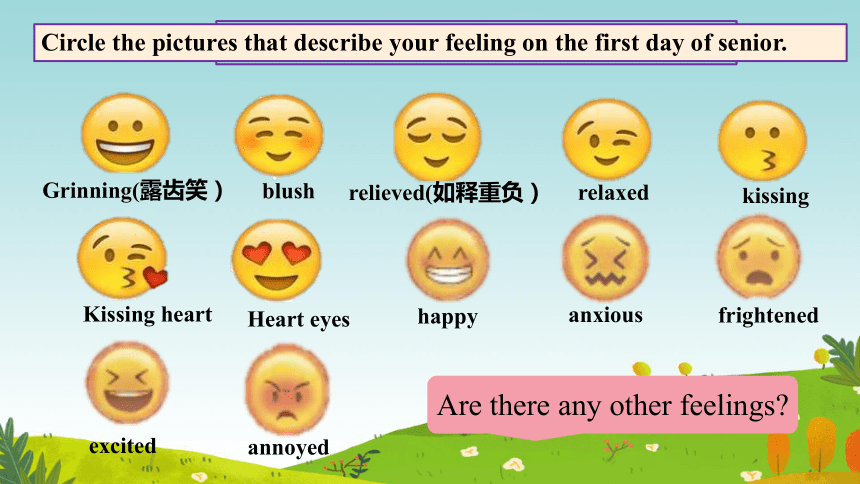
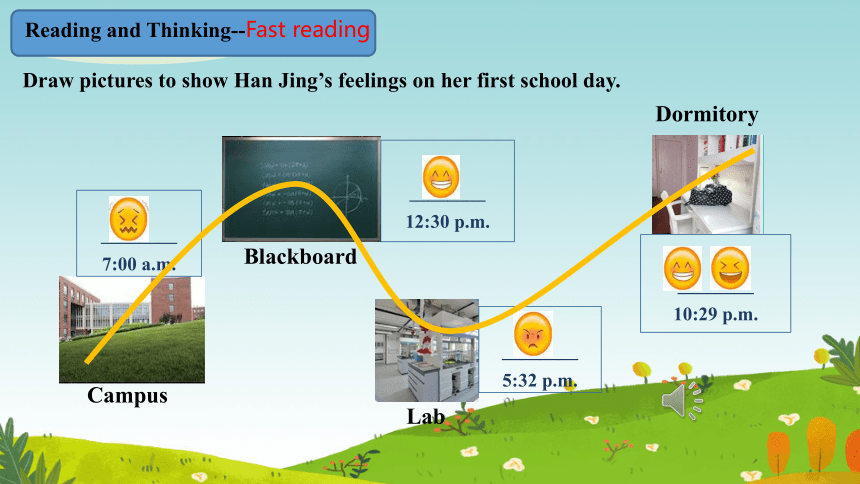
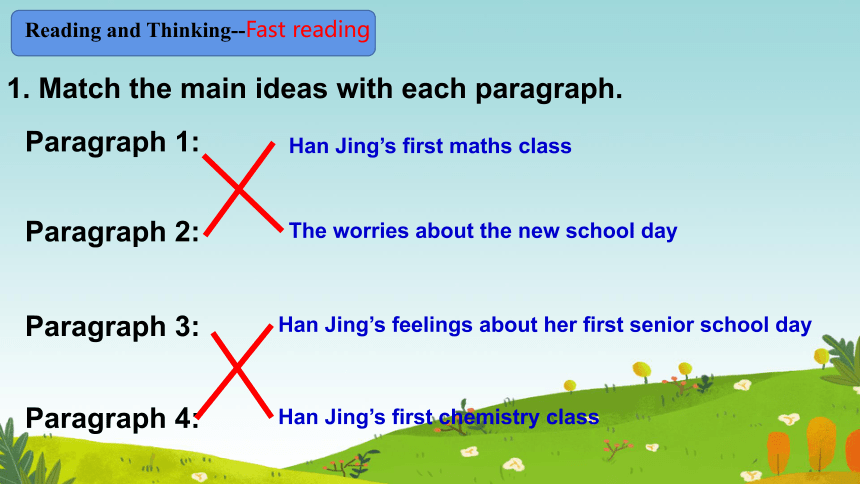
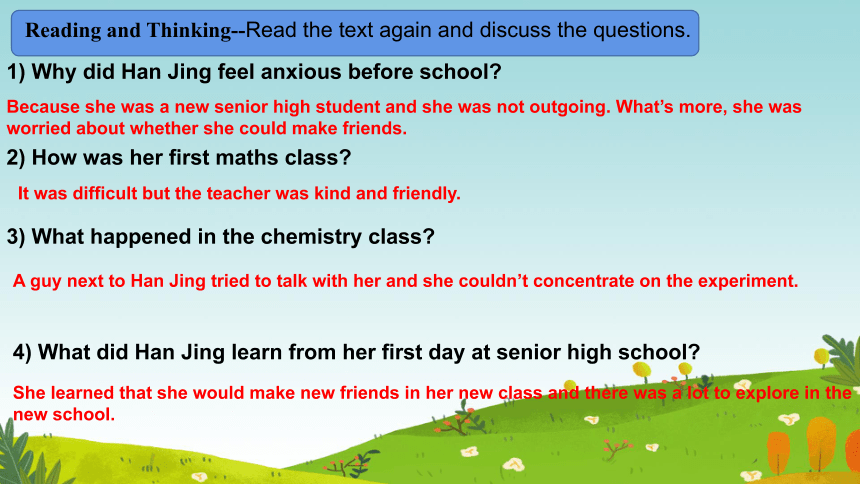
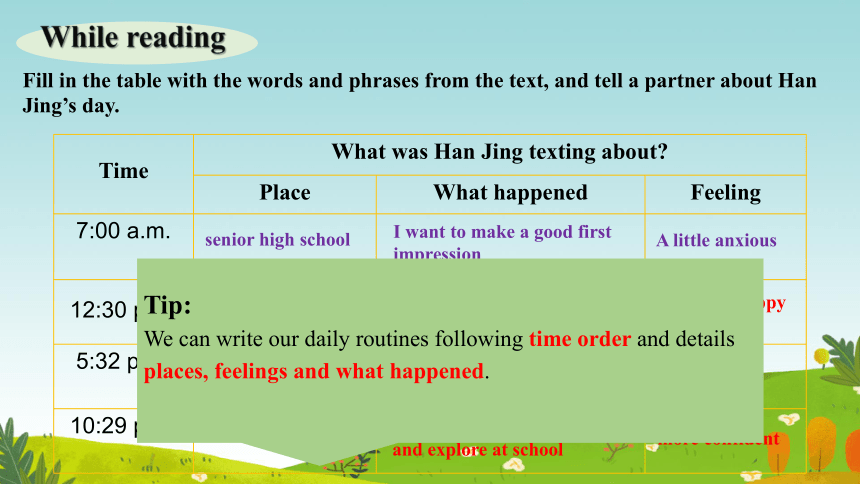
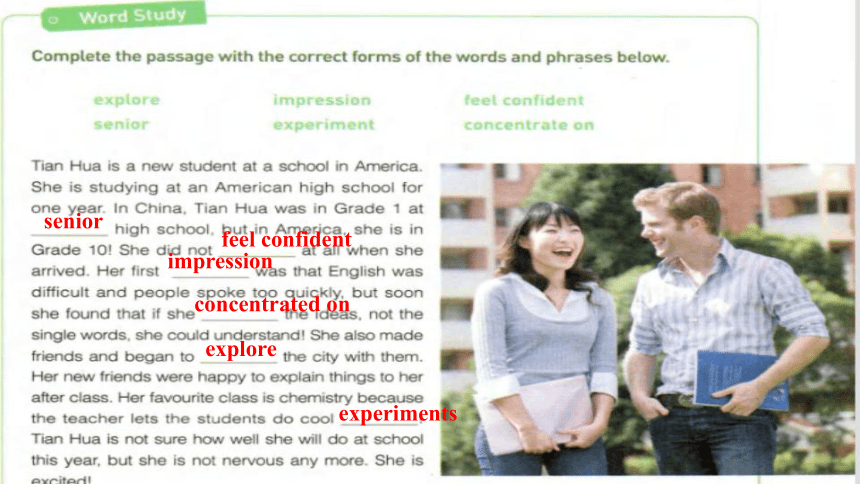
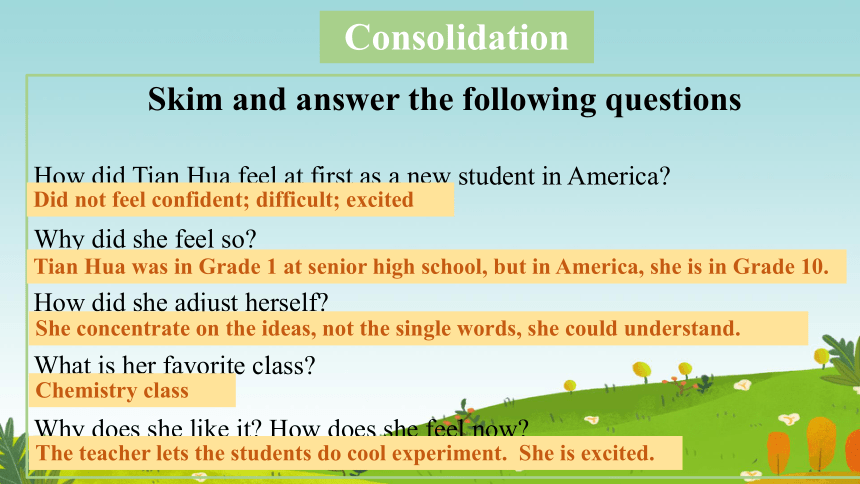
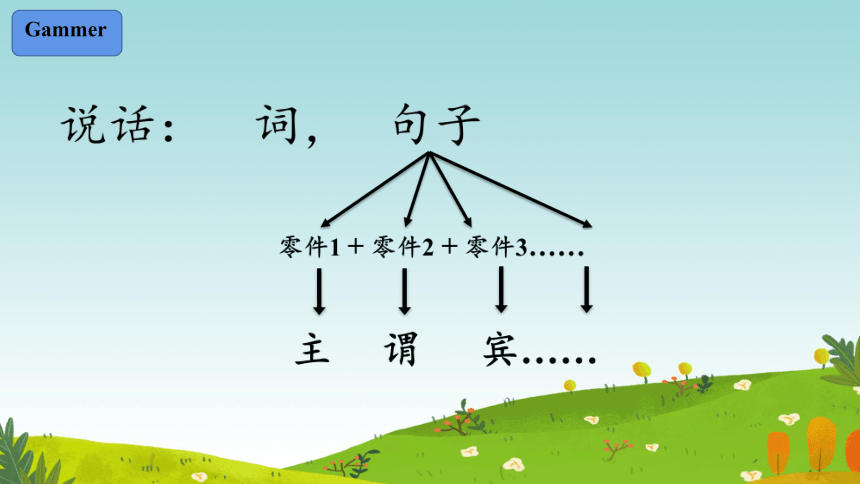
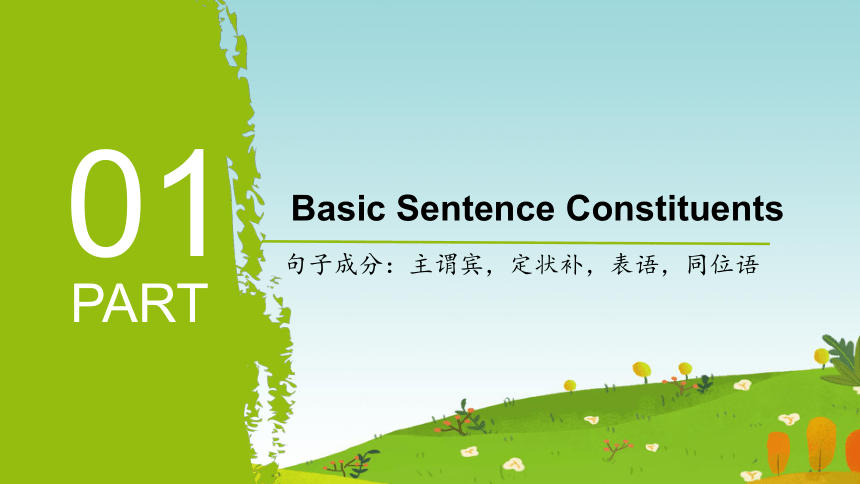
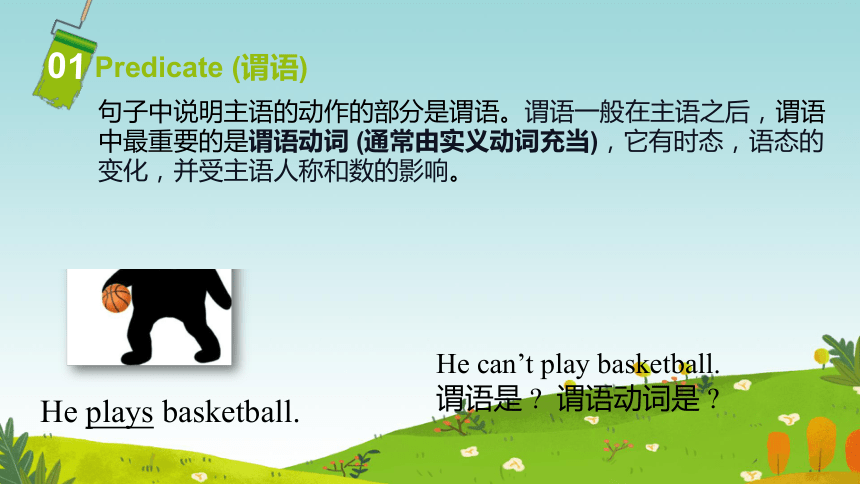

文档简介
(共35张PPT)
Reading and Thinking
Describe your first senior high school day
What every emotion actually means
Grinning(露齿笑)
relieved(如释重负)
relaxed
blush
kissing
Kissing heart
Heart eyes
happy
anxious
excited
annoyed
frightened
Circle the pictures that describe your feeling on the first day of senior.
Are there any other feelings
While reading
Draw pictures to show Han Jing’s feelings on her first school day.
————
7:00 a.m.
————
12:30 p.m.
————
5:32 p.m.
Campus
Blackboard
Lab
————
10:29 p.m.
Dormitory
Reading and Thinking--Fast reading
Reading and Thinking--Fast reading
1. Match the main ideas with each paragraph.
Paragraph 1:
Paragraph 2:
Paragraph 3:
Paragraph 4:
Han Jing’s first maths class
The worries about the new school day
Han Jing’s first chemistry class
Han Jing’s feelings about her first senior school day
Reading and Thinking--Read the text again and discuss the questions.
1) Why did Han Jing feel anxious before school
2) How was her first maths class
3) What happened in the chemistry class
4) What did Han Jing learn from her first day at senior high school
Because she was a new senior high student and she was not outgoing. What’s more, she was worried about whether she could make friends.
It was difficult but the teacher was kind and friendly.
A guy next to Han Jing tried to talk with her and she couldn’t concentrate on the experiment.
She learned that she would make new friends in her new class and there was a lot to explore in the new school.
While reading
Fill in the table with the words and phrases from the text, and tell a partner about Han Jing’s day.
Time What was Han Jing texting about
Place What happened Feeling
7:00 a.m.
12:30 p.m.
5:32 p.m.
10:29 p.m.
senior high school
I want to make a good first impression
A little anxious
maths class
The teacher told funny stories. Everyone laughed.
Difficult; happy
chemistry class
The guy next to me tried to talk to me the whole time, couldn’t concentrate on the experiment
annoyed
In the dormitory
Decide to make new friends, and explore at school
more confident
Tip:
We can write our daily routines following time order and details places, feelings and what happened.
senior
feel confident
impression
concentrated on
explore
experiments
Consolidation
Skim and answer the following questions
How did Tian Hua feel at first as a new student in America
Why did she feel so
How did she adjust herself
What is her favorite class
Why does she like it How does she feel now
Did not feel confident; difficult; excited
Tian Hua was in Grade 1 at senior high school, but in America, she is in Grade 10.
She concentrate on the ideas, not the single words, she could understand.
Chemistry class
The teacher lets the students do cool experiment. She is excited.
Gammer
01
PART
Basic Sentence Constituents
句子成分:主谓宾,定状补,表语,同位语
01
Predicate (谓语)
句子中说明主语的动作的部分是谓语。谓语一般在主语之后,谓语中最重要的是谓语动词 (通常由实义动词充当),它有时态,语态的变化,并受主语人称和数的影响。
He plays basketball.
He can’t play basketball.
谓语是 谓语动词是
(1) 实义动词 (行为动词):
具有明确的动作和意义。该类动词又可以分为及物动词和不及物动词,不及物不接宾语,及物动词接宾语。
I know you.
He comes.
(2) 助动词
帮助谓语动词构成不同的时态或语态,或构成疑问句,否定句和强调句。
常见助动词有 am(is/are/was/were),do(does/did), have(has/had), will(would)。
1.I am playing games.
2.Do you know me
3.I do not like you.
4.The policeman will find you.
(3) 情态动词
有一定词义,表说话人对某一动作或状态的态度和看法,表能力,允许,请求,必要性,可能性等。
常见情态动词有can/could/may/might/should/must/would 等。
I can do it.
(2) 系动词 (连系动词) 起连接主语和表语作用,本身有一定词义,它和实义动词
一样有时态变化,也受主语人称和数的影响。
常见系动词:
be (am/is/are/was/were);
感官:smell, sound, taste, look, seem, feel(摸起来), appear;
变得:become/get/grow/turn/fall/go(变得) ;
保持:remain (仍然是) ,keep/stay;
1. The car is cool.
2. The rose smells good.
3. She is in shape.
Subject (主语)
02
相当于句子的话题或主题,即要说明的人或物。
能用来做主语的有名词,代词,动名词,动词不定式,主语从句。
1.My hat is blue.
2.Her pen is green, and mine is red.
These are my books.
Who is your brother
Everything is bad.
3.Eating apples is good.
4.To play games is cool.
5.That Jason is cool is true.
03
Object (宾语)
表谓语动词动作的承受对象,即:动作的承受着。
英语中及物动词和介词需要带宾语。
1.I like music.
2.I like to play basketball.
3.I like dancing.
4.I like you.
I like this.
5.I think that he is cool.
作宾语的成分:
名词,代词,不定式,动名词,从句。
双宾语
give, tell, offer, send,read, show, teach, lend, buy, leave等
v.+sb.+sth
04
Predicative (表语)
表语在句中用来说明主语的身份职业,性质特征, 状态,方向或处所等。表语在系动词之后。
1.I am a student.
2.This is my book. That is yours.
3.I am happy.
4.My dream is to be a doctor.
5.My job is teaching English.
6.The movie is interesting.
7.I am interested in the book.
8.That is why I want to stay here.
作表语的成分有:
名词,代词,形容词,不定式,动名词,分词,从句。
05
Attributive (定语)
修饰名词或代词的词,短语或句子叫定语。定语可前置也可后置。单个的单词作定语时,习惯上放在被修饰词之前作前置定语;短语或定语从句作定语时,习惯上作后置定语。
1.A beautiful girl comes.
2.I like the apple tree.
3.The boy in the room is my friend.
4.I go to the reading room.
5.I am the first student to come to the classroom.
6.A broken heart.
7.An interesting book.
8.I know a boy called Tom.
9.The car running in the playground is my uncle’s car.
10.I know the boy who broke the window yesterday.
可作定语的有:
名词,形容词,介词短语,分词(短语) ,不定式,动名词,定语从句。
06
Adverbial (状语)
修饰动词,形容词,副词或整个句子的词,短语或从句(状语从句)叫状语。状语表示时间,地点,目的,原因,结果,条件,让步,程度,方式及伴随等。
1.He plays the guitar well.
2.Luckily, he won the game.
3.I am very happy.
4.He works hard to make money.
5.I can’t go there.
6.In Wuhan, many people can’t go out.
7.Although I don’t have money, I still want to buy that book.
8.When I have time , I will go shopping with you.
9.I didn’t go to school because I was ill.
10. If it rains tomorrow, we will stay at home.
能作状语的有:
副词,介词短语,分词(短语),不定式,状语从句。
07
Complement (补语)
英语中,一些及物动词的宾语后要加上一个补语,对宾语作进一步的补充说明,意思才够完整和明确。该补语被称为宾补。
使役动词 “make+宾语+宾补”
名词/代词
名词/形容词/省掉to的不定式/过去分词
1.We make our enemies our friends.
2.You make me happy.
3.You made me laugh.
4.I spoke slowly to make myself understood.
使役动词 make,let,have,get,leave
部分感官动词see,notice, observe(观察),hear,watch,
keep,find,call,elect(选举),consider(认为).........
v.+sb./sth.+.....
08
Appositive (同位语)
跟在抽象名词后面,对该抽象名词作进一步解释,说明的成分。
常用来作同位语的有:名词,数词,不定代词 (all, each , both), 同位语从句。
1. Simon , a senior high school, is good.
2.We four like the teacher.
3.We all like Simon.
4.I know the fact that Simon is good.
Basic Sentence Patterns
八大基本句型结构
02
PART
主谓 (SV)
01
这一类型的谓语动词通常是不及物动词,
不需要带宾语就能把意思说明白。
The bus comes.
The bus leaves.
主谓+状语 (SVA)
02
在主谓的基础上加上时间、地点、原因、条件、方式等。
He left in the morning.
状语
主谓宾 (SVO)
03
此时,谓语动词是及物动词,必须带宾语,才能把话说明白。
I have a friend.
I want to travel.
主谓宾+状语 (SVOA)
04
在主谓宾句型的基础上补充时间,地点,原因,条件,方式等信息。
I have my first class at senior high school .
状语
主系表 (SP)
05
常见系动词:
be(am/is/are/was/were);
感官动词:smell, sound, taste, look, seem, feel(摸起来), appear;
变得:become/get/grow/turn/fall/go;
保持:remain(仍然是),keep/stay;
2. The rose smells good.
1. The car is cool.
主+谓+间宾+直宾 (SV IO DO)
06
人
物
此时,谓语动词常为:
give, bring, tell, send, leave(留), pass(传递), write, take, show, teach, get(给某人弄到某物), award (授予), lend, rent(租), buy, pay, hand(递给) + sb + sth .
She gives me her WeChat ID.
Lend me some money !
主谓宾+宾补 (SVOC)
07
有些及物动词加了宾语,但是意思还是没有说完整,此时还得在宾语后面再加一个宾补对宾语进行不充说明。
常见带宾补的动词:
feel, find, get, have, make, leave, let, keep, call, think等。
The news makes the mother happy.
There be …
08
该句型可以表示“某地有(存在)某物”,
或当我们不知道是谁有……时,也可用该句型。
There are many students in a school.
写出下列句子中画线部分的成分
1. To do today’s homework without the teacher’s help is very difficult. ____________
2. The old man sitting at the gate said he was ill. ______
3. Why is he worried about Jim ___________
4. She was the first to learn about it. _________
5. I saw Mr Wang get on the bus._________
6. Every night he heard the noise upstairs. _________
7. Mr Li is going to teach us history next term. ______; ______
8. I poured my drink down the sink. ________
9. We found nobody in. _______
10. The man downstairs was trying to sleep. _________
Reading and Thinking
Describe your first senior high school day
What every emotion actually means
Grinning(露齿笑)
relieved(如释重负)
relaxed
blush
kissing
Kissing heart
Heart eyes
happy
anxious
excited
annoyed
frightened
Circle the pictures that describe your feeling on the first day of senior.
Are there any other feelings
While reading
Draw pictures to show Han Jing’s feelings on her first school day.
————
7:00 a.m.
————
12:30 p.m.
————
5:32 p.m.
Campus
Blackboard
Lab
————
10:29 p.m.
Dormitory
Reading and Thinking--Fast reading
Reading and Thinking--Fast reading
1. Match the main ideas with each paragraph.
Paragraph 1:
Paragraph 2:
Paragraph 3:
Paragraph 4:
Han Jing’s first maths class
The worries about the new school day
Han Jing’s first chemistry class
Han Jing’s feelings about her first senior school day
Reading and Thinking--Read the text again and discuss the questions.
1) Why did Han Jing feel anxious before school
2) How was her first maths class
3) What happened in the chemistry class
4) What did Han Jing learn from her first day at senior high school
Because she was a new senior high student and she was not outgoing. What’s more, she was worried about whether she could make friends.
It was difficult but the teacher was kind and friendly.
A guy next to Han Jing tried to talk with her and she couldn’t concentrate on the experiment.
She learned that she would make new friends in her new class and there was a lot to explore in the new school.
While reading
Fill in the table with the words and phrases from the text, and tell a partner about Han Jing’s day.
Time What was Han Jing texting about
Place What happened Feeling
7:00 a.m.
12:30 p.m.
5:32 p.m.
10:29 p.m.
senior high school
I want to make a good first impression
A little anxious
maths class
The teacher told funny stories. Everyone laughed.
Difficult; happy
chemistry class
The guy next to me tried to talk to me the whole time, couldn’t concentrate on the experiment
annoyed
In the dormitory
Decide to make new friends, and explore at school
more confident
Tip:
We can write our daily routines following time order and details places, feelings and what happened.
senior
feel confident
impression
concentrated on
explore
experiments
Consolidation
Skim and answer the following questions
How did Tian Hua feel at first as a new student in America
Why did she feel so
How did she adjust herself
What is her favorite class
Why does she like it How does she feel now
Did not feel confident; difficult; excited
Tian Hua was in Grade 1 at senior high school, but in America, she is in Grade 10.
She concentrate on the ideas, not the single words, she could understand.
Chemistry class
The teacher lets the students do cool experiment. She is excited.
Gammer
01
PART
Basic Sentence Constituents
句子成分:主谓宾,定状补,表语,同位语
01
Predicate (谓语)
句子中说明主语的动作的部分是谓语。谓语一般在主语之后,谓语中最重要的是谓语动词 (通常由实义动词充当),它有时态,语态的变化,并受主语人称和数的影响。
He plays basketball.
He can’t play basketball.
谓语是 谓语动词是
(1) 实义动词 (行为动词):
具有明确的动作和意义。该类动词又可以分为及物动词和不及物动词,不及物不接宾语,及物动词接宾语。
I know you.
He comes.
(2) 助动词
帮助谓语动词构成不同的时态或语态,或构成疑问句,否定句和强调句。
常见助动词有 am(is/are/was/were),do(does/did), have(has/had), will(would)。
1.I am playing games.
2.Do you know me
3.I do not like you.
4.The policeman will find you.
(3) 情态动词
有一定词义,表说话人对某一动作或状态的态度和看法,表能力,允许,请求,必要性,可能性等。
常见情态动词有can/could/may/might/should/must/would 等。
I can do it.
(2) 系动词 (连系动词) 起连接主语和表语作用,本身有一定词义,它和实义动词
一样有时态变化,也受主语人称和数的影响。
常见系动词:
be (am/is/are/was/were);
感官:smell, sound, taste, look, seem, feel(摸起来), appear;
变得:become/get/grow/turn/fall/go(变得) ;
保持:remain (仍然是) ,keep/stay;
1. The car is cool.
2. The rose smells good.
3. She is in shape.
Subject (主语)
02
相当于句子的话题或主题,即要说明的人或物。
能用来做主语的有名词,代词,动名词,动词不定式,主语从句。
1.My hat is blue.
2.Her pen is green, and mine is red.
These are my books.
Who is your brother
Everything is bad.
3.Eating apples is good.
4.To play games is cool.
5.That Jason is cool is true.
03
Object (宾语)
表谓语动词动作的承受对象,即:动作的承受着。
英语中及物动词和介词需要带宾语。
1.I like music.
2.I like to play basketball.
3.I like dancing.
4.I like you.
I like this.
5.I think that he is cool.
作宾语的成分:
名词,代词,不定式,动名词,从句。
双宾语
give, tell, offer, send,read, show, teach, lend, buy, leave等
v.+sb.+sth
04
Predicative (表语)
表语在句中用来说明主语的身份职业,性质特征, 状态,方向或处所等。表语在系动词之后。
1.I am a student.
2.This is my book. That is yours.
3.I am happy.
4.My dream is to be a doctor.
5.My job is teaching English.
6.The movie is interesting.
7.I am interested in the book.
8.That is why I want to stay here.
作表语的成分有:
名词,代词,形容词,不定式,动名词,分词,从句。
05
Attributive (定语)
修饰名词或代词的词,短语或句子叫定语。定语可前置也可后置。单个的单词作定语时,习惯上放在被修饰词之前作前置定语;短语或定语从句作定语时,习惯上作后置定语。
1.A beautiful girl comes.
2.I like the apple tree.
3.The boy in the room is my friend.
4.I go to the reading room.
5.I am the first student to come to the classroom.
6.A broken heart.
7.An interesting book.
8.I know a boy called Tom.
9.The car running in the playground is my uncle’s car.
10.I know the boy who broke the window yesterday.
可作定语的有:
名词,形容词,介词短语,分词(短语) ,不定式,动名词,定语从句。
06
Adverbial (状语)
修饰动词,形容词,副词或整个句子的词,短语或从句(状语从句)叫状语。状语表示时间,地点,目的,原因,结果,条件,让步,程度,方式及伴随等。
1.He plays the guitar well.
2.Luckily, he won the game.
3.I am very happy.
4.He works hard to make money.
5.I can’t go there.
6.In Wuhan, many people can’t go out.
7.Although I don’t have money, I still want to buy that book.
8.When I have time , I will go shopping with you.
9.I didn’t go to school because I was ill.
10. If it rains tomorrow, we will stay at home.
能作状语的有:
副词,介词短语,分词(短语),不定式,状语从句。
07
Complement (补语)
英语中,一些及物动词的宾语后要加上一个补语,对宾语作进一步的补充说明,意思才够完整和明确。该补语被称为宾补。
使役动词 “make+宾语+宾补”
名词/代词
名词/形容词/省掉to的不定式/过去分词
1.We make our enemies our friends.
2.You make me happy.
3.You made me laugh.
4.I spoke slowly to make myself understood.
使役动词 make,let,have,get,leave
部分感官动词see,notice, observe(观察),hear,watch,
keep,find,call,elect(选举),consider(认为).........
v.+sb./sth.+.....
08
Appositive (同位语)
跟在抽象名词后面,对该抽象名词作进一步解释,说明的成分。
常用来作同位语的有:名词,数词,不定代词 (all, each , both), 同位语从句。
1. Simon , a senior high school, is good.
2.We four like the teacher.
3.We all like Simon.
4.I know the fact that Simon is good.
Basic Sentence Patterns
八大基本句型结构
02
PART
主谓 (SV)
01
这一类型的谓语动词通常是不及物动词,
不需要带宾语就能把意思说明白。
The bus comes.
The bus leaves.
主谓+状语 (SVA)
02
在主谓的基础上加上时间、地点、原因、条件、方式等。
He left in the morning.
状语
主谓宾 (SVO)
03
此时,谓语动词是及物动词,必须带宾语,才能把话说明白。
I have a friend.
I want to travel.
主谓宾+状语 (SVOA)
04
在主谓宾句型的基础上补充时间,地点,原因,条件,方式等信息。
I have my first class at senior high school .
状语
主系表 (SP)
05
常见系动词:
be(am/is/are/was/were);
感官动词:smell, sound, taste, look, seem, feel(摸起来), appear;
变得:become/get/grow/turn/fall/go;
保持:remain(仍然是),keep/stay;
2. The rose smells good.
1. The car is cool.
主+谓+间宾+直宾 (SV IO DO)
06
人
物
此时,谓语动词常为:
give, bring, tell, send, leave(留), pass(传递), write, take, show, teach, get(给某人弄到某物), award (授予), lend, rent(租), buy, pay, hand(递给) + sb + sth .
She gives me her WeChat ID.
Lend me some money !
主谓宾+宾补 (SVOC)
07
有些及物动词加了宾语,但是意思还是没有说完整,此时还得在宾语后面再加一个宾补对宾语进行不充说明。
常见带宾补的动词:
feel, find, get, have, make, leave, let, keep, call, think等。
The news makes the mother happy.
There be …
08
该句型可以表示“某地有(存在)某物”,
或当我们不知道是谁有……时,也可用该句型。
There are many students in a school.
写出下列句子中画线部分的成分
1. To do today’s homework without the teacher’s help is very difficult. ____________
2. The old man sitting at the gate said he was ill. ______
3. Why is he worried about Jim ___________
4. She was the first to learn about it. _________
5. I saw Mr Wang get on the bus._________
6. Every night he heard the noise upstairs. _________
7. Mr Li is going to teach us history next term. ______; ______
8. I poured my drink down the sink. ________
9. We found nobody in. _______
10. The man downstairs was trying to sleep. _________
